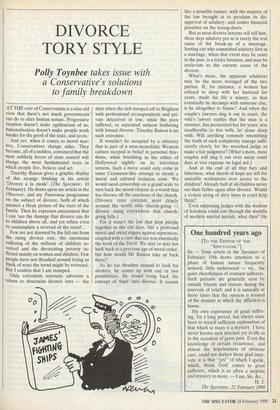DIVORCE TORY STYLE
a Conservative's solutions to family breakdown
AT THE core of Conservatism is a wise old view that there's not much governments ' can do to alter human nature. Progressive taxation doesn't make egalitarians of us, nationalisation doesn't make people work harder for the good of the state, and so on.
And yet, when it comes to moral mat- ters, Conservatives change sides. They become, all of a sudden, convinced that the most unlikely levers of state control will change the most fundamental ways in Which people live, believe and act.
Timothy Raison gives a graphic display of this strange thinking in his article
'Divorce a la mode' (The Spectator, 10 February). He draws upon my article in the Observer, and my Panorama programme
on the subject of divorce, both of which painted a bleak picture of the state of the family. Then he expresses amazement that I can 'see the damage that divorce can do to children above all, and yet refuse even to contemplate a reversal of the trend'.
Few are not alarmed by the fall-out from the rising divorce rate, the emotional suffering of the millions of children in- volved and the devastating poverty in- flicted mainly on women and children. Few People have not thrashed around trying to think of ways the trend might be reversed. But I confess that I am stumped.
Only extremists seriously advocate a return to draconian divorce laws --- the days when the rich trooped off to Brighton with professional co-respondents and pri- vate detectives in tow, while the poor suffered, or separated without bothering with formal divorce. Timothy Raison is no such extremist.
It wouldn't be accepted by a citizenry that is part of a near-monolithic Western culture steeped in belief in personal free- doms, while breathing in the ethics of Hollywood nightly on its television screens. Such a move could only come in some Ceausescu-like attempt to create a moral and cultural isolation zone. We would need censorship on a grand scale to turn back the moral climate in a world that has thrown off the sanctions of the church. (Divorce rates correlate most closely around the world with church-going — divorce rising everywhere that church- going falls.) For it wasn't the law that kept people together in the old days, but a profound moral and satial stigma against separation, coupled with a view that sex was essentially the work of the Devil. We may or may not hark back to a previous age of moral order, but how would Mr Raison take us back there?
As he too thrashes around to look for answers, he comes up with one or two possibilities. He would bring back the concept of 'fault' into divorce. It sounds like a possible runner, with the majesty of the law brought in to proclaim its dis- approval of adultery, and confer financial penalties on the wrong-doers.
But as most divorce lawyers will tell him, these days adultery per se is rarely the real cause of the break-up of a marriage. Sorting out who committed adultery first in a marriage, when that event may be years in the past, is a tricky business, and may be irrelevant to the current cause of the divorce.
What's more, the apparent adulterer may be the more wronged of the two parties. If, for instance, a woman has refused to sleep with her husband for years, made his life a misery, so that eventually he decamps with someone else, is he altogether to blame? And when the couple's lawyers slug it out in court, the wife's lawyer replies that the man is a monster, has persecuted her for years, was insufferable to live with, let alone sleep with. Will anything remotely resembling the truth of such complexity emerge suffi- ciently clearly for the wretched judge to make a fair judgment? (What's more, most couples will slug it out over many court days at vast expense on legal aid.) And at the end of all that fury and bitterness, what shreds of hope are left for amicable settlements over access to the children? Already half of all children never see their father again after divorce. Would a violent airing of dirty linen in court help them?
Even supposing judges with the wisdom of Solomon could sort through the muddle of modern marital morals, what then? He must translate that blame into penalty. If the man is to blame, it would make little difference. Already a man must pay, re- gardless of blame, as a life-long paternal duty, for the upkeep of his children. As it is, men pay pitifully little, but most can't pay much more, because one average income will never cover the cost of keeping wife and children and himself. If he is made to pay more than leaves him enough to eat, he will have to put himself on the dole. While no doubt richer men could pay more, it would apply to very few divorces indeed. (Divorces are most frequent. at the bottom of the social scale, rarest at the top.) So the penalty would make little differ- ence to men. That means that 'fault' would, in the great majority of cases, only fall upon the wife and children. If she were to blame, her husband's payments to her and the children would be reduced accor- dingly. (Virtually no money these days is paid in alimony to the wife.) It would become a law whose effect would only fall on women.
Part of the tragedy of divorce is that women and children of every class lose on average 40 per cent of their income. Men suffer a minor set-back but catch up again. Women rarely do, since most are unable to go out to work to earn enough to keep a family. The great majority of divorced women and children live off the state thereafter, or until remarriage. Anything that reduced rather than increased the amount a man ,contributed to his ex-family would be a disastrous move. The Govern- ment is now about to move in the opposite direction, determined to draw more maintenance out of errant fathers (or, exceedingly rarely, mothers), on the grounds that marriages may break up, but parenthood is for ever.
Timothy Raison turns then to the tax and benefit system, in search of more super-glue with which to bind partners together. Here his solutions are even more puny and inadequate for the mighty moral task he has in mind.
He deplores the fact that unmarried couples with children will, from April, be able to draw on the same tax allowances as the married, removing any financial incen- tive towards marriage in the tax system. Though he says he doesn't want to discri- minate against children, taking money from unmarried parents would. For the children with unmarried parents are more likely to be in a precarious state, with parents more likely to separate. At least this provides them, if one believed in such things, with a tiny incentive to stay together.
But the notion that a small personal allowance is going to make the key differ- ence in people's decisions about whether to get married or stay together is fanciful. Divorce lawyers will tell Mr Raison that when people decide to marry or divorce, money is usually the very last thing they think about — alas. They do it because they feel they must.
Divorce doesn't make people happy. Suicide rates are 24 times higher, and many regret it. Despite the trauma people inflict on themselves and their children, Mr Raison must imagine people divorce with reckless frivolity to believe that their be- haviour would be changed by any of the little measures he suggests.
However, if he imagines tinkering with the tax and benefit system could help produce disincentives to divorce, he should look at how the system works now. We have created a society, by accident rather than design, where the greatest penalties already fall upon one-parent families. They have less than half the income of two-parent families, they live in the worst housing, their children do worst at school. It would be hard to create a less appealing prospect. They present the very picture of the Victorian 'Fall', for though the moral stigma no longer applies, the financial one certainly does. Their prospects are as dismal as even the sternest moralist could hope.
Yet this mighty deterrent doesn't seem to stem the growth of divorce and single parenthood. What makes him think further penalties would do any better? How much more does he think can be taken away from them in order to bring about the miraculous social engineering he envis- ages?
I argued that since it's not in the power of government to reverse the moral cli- mate, then we must turn our attention to minimising the damage done to families and children by divorce. All divorcing couples should attend conciliation before waiting for court, to warn them of the likely consequences for them and their children. If they go ahead, then they must be pushed towards making the best possi- ble access arrangements. After that, if government doesn't want to see women and children fall into life-long state de- pendency, then it must help them to work (since most desperately want to) by giving them the training and the child care they need for independence.
It may seem temptingly desirable for the state to stamp its disapproval on divorce, but not if it only makes the situation worse for its most vulnerable victims. I can think of no way for the state to intervene that wouldn't. It's not defeatism, but realism. Mr Raison accuses myself and Lady Ewart- Biggs of some kind of underhand — though 'mournfully honest' — feminism. I see it as an urgent question of how we are to bring up children in a society where one in five will see their parents divorce before they reach the age of 16.
Polly Toynbee is editor of the Social Affairs Unit at the BBC.



















































 Previous page
Previous page